With this article, I want to give a complete and comprehensive explanation of the fundamental difference between eating less, counting calories, and eating less often, restricting your daily eating window. This will be backed up by many studies on the subject and my own experience. How eating less often could actually be more effective than eating less?
Calorie restriction will starve your body. It will not get enough calories to function properly, so it will burn fat and muscle, slowing down your metabolism, to burn as few calories as possible. Fasting will give your body time in between meals to get used to burning fat for fuel. Fasting is a natural state for the body, starvation is not.
That’s great, but it doesn’t answer all the questions of course: which is more effective for weight loss? Why would calorie restriction be recommended by almost every doctor on the planet if it was unhealthy? etc.
Let me spend some time answering those questions and many more in this complete explanation.
What I Mean By Eating Less And Fasting
Eating Less
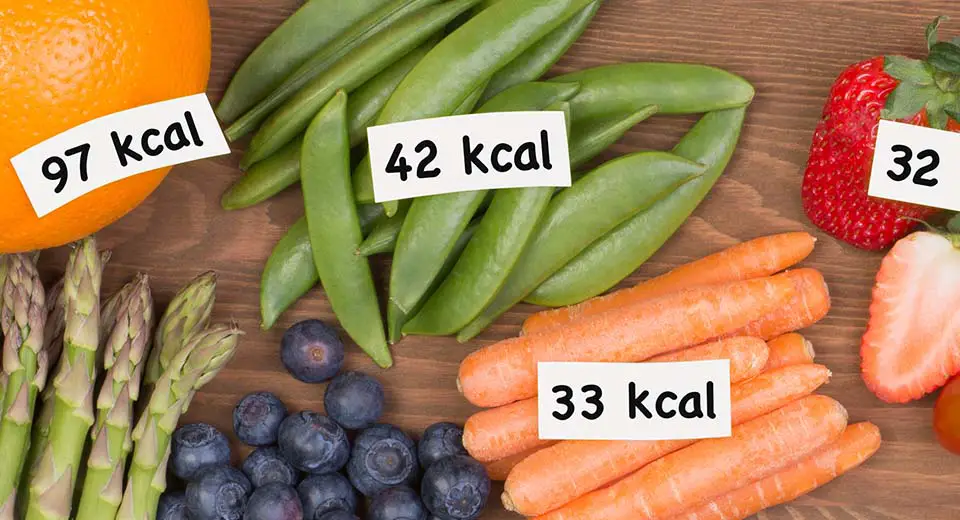
When I talk about eating less, this means any kind of standard calorie restriction diet.
What’s important in these types of diet is not as much what you eat, but how much you eat.
Mostly, calorie restriction means you’ll count calories for every food you get, check your daily intake, in order to get less than your body actually uses to burn fat in the process.
These types of diet never require you to eat less often, generally, you keep your usual eating schedules. If you want, you can even eat more often (5 or 6 times a day) as long as you don’t eat more than you should.
The same diet can be done without counting calories, but simply by restricting how much you eat with each meal, never eating to actual satiety.
Fasting

When I say fasting, I mean extended period during which you don’t eat.
It would be even more precise to say that what’s important is not how long you go without eating for a day, but how short your eating window is during the day.
An eating window is calculated between the first calorie intake you get during the day to the last.
If you break your fast at noon and get your last calories at 7pm, then your eating window during the day is 7 hours. If you do that consistantly, you’re intermittent fasting in the form 17:7.
17 hours of fasting and a 7 hours eating window.
It doesn’t have to be every day, you can do alternate-day fasting, but many consider that going 12 hours without calorie is already some type of fasting.
So to summarize, you don’t have to go three days without eating to be fasting, just restrict how often you eat and the time, during the day, you allow yourself to get calories.
How Eating Less Through Calorie Restriction Works?
It all depends on how you’re going to implement calorie restriction, but the main guideline is always the same: getting fewer calories than you burn on a daily basis, without leading to malnutrition.
Typical calorie restriction requires you to start by determining how much calories your body actually needs to function each day.
This number will greatly depend on your age, sex, height, weight and activity level. The easiest way to accuratly determine your needs is to :
- Determine your Basal Metabolic Rate (BMR), for example with this calculator. This number defines how much calories your body will burn throughout the day for essential functions. You should not aim for a number lower than that when restricting calories
- Calculate your daily requirements, the number of calories you would need to keep your actual weight. You can this calculator for this
- Calculate how much calories you need for weight loss. The amount should lie between your BMR and daily requirements.
With that in mind, you’ll be able to find a sustainable number of calories to follow. Then the last thing you could do is track what you eat with an app such as Cronometer for example.
And you’re good to go! Now you’ll plan your days never to eat more than the number you set on to, tracking what you eat, counting calories.
Then the process goes on: once your daily calorie requirements correspond to your daily calorie intake, meaning your BMR will have gone down, you’ll have lost some weight, etc. you’ll define a new calorie limit if you want to keep losing weight.
It’s not really harder than that on paper, what can be strenuous is to be counting calories for every meal, and every snack you get, but the upside is as long as you keep to the number, you can eat anything you want.
All this thanks the the calorie hypothesis!
The Calorie Hypothesis
You must know the hypothesis that “a calorie is a calorie” and that if you eat fewer calories during the day than you actually burn, you’ll lose weight.
These ideas have been around for quite a while. Max Rubner, a German nutritionist, started developing his “isodynamic law” as soon as 1878.
During the 1900s, there’s been a number of different diets promoting low-calorie as a way to lose weight. Here are a few examples :
- In the 30s, a diet called the Grapefruit Diet was introduced. You had to eat grapefruit with every meal… while never eating more than 1’000 calories a day
- Later in the ’50s, cabbage diets were more of the same: around 800 to 1’000 calories a day, and cabbage
- The same type of diet, called the Cookie Diet, emerged in the ’70s. Again, 800 calories a day, coming primarily, not exactly from cookies, but from high-protein biscuits
But how would that actually work? How calories are able to turn into fat into your body?
Because that’s the main idea: too many calories mean more fat. And people will bring up the famous Law of Thermodynamics in order to prove their point.
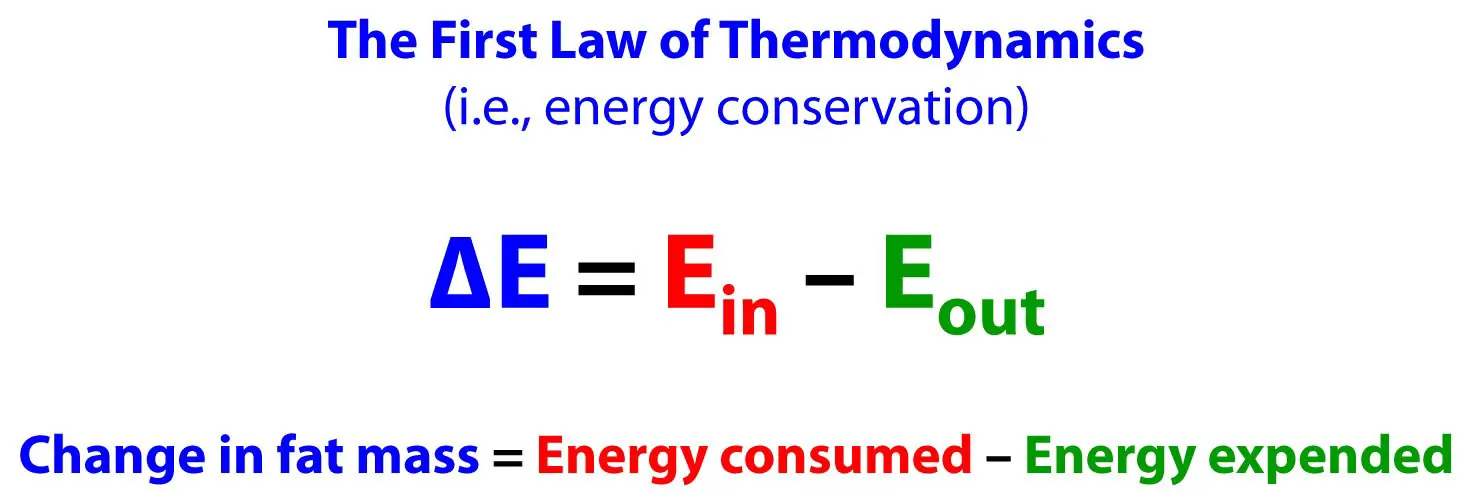
Except this law and the whole calorie in, calorie out, can in no way create new fat. There’s no pathway in the body, no enzyme or hormone that can link a calorie to new fat.
A calorie is not a nutrient or something you could see inside your food with a microscope, it’s simply a measurement unit.
As you may know, when we mention calories it usually refers to kilocalories. This measurement unit is used to calculate what amount of energy is needed in order to increase one liter of water’s temperature of 1-degree celsius.
So, what’s happening in the body when you’re burning a calorie? Basically, you’ll be raising up your body’s core temperature, by heating your body’s water.
You could calculate how many kilocalories you would need to bring a pot of water to the boil, and all that has nothing to do with biology, it’s simple physic.
A calorie being a calorie means it doesn’t matter what you eat, what’s important is the calories you’ll get from it. If we consider that :
- Fat has 9 kcal per gram
- Alcohol has 7 kcal per gram
- Protein has 4 kcal per gram
- Carb has 4 kcal per gram
- Oh, and by the way diesel has 10 kcal per gram
This would mean you should avoid fat even more than alcohol. But you know getting fat from salmon or butter doesn’t equate in any way to having a beer or a glass of wine.
And you know you should stay away from diesel right? Regardless of the amount of calories it represents.
Calories are simply a way to measure the energy provided by food, it doesn’t tell you anything about the nutrients or how your body will break down this food.
The body won’t react the same if you eat a chicken breast, lettuce, nuts, pasta, orange juice, etc. regardless of how many calories any of these foods provide you.
Focusing on calories as the single aspect of dieting, is like focusing on cholesterol when suffering from cardiovascular disease, you don’t kill the messenger when you receive bad news, do you?
But It Works For Weight Loss!
You might wonder if a calorie is not simply a calorie, how come counting them has proved to be an efficient way to lose weight?
I’m not talking about reducing your calorie intake by 50 or 100 calories, you would have to calculate your daily needs and bring them down by at least 500 calories in order for it to work.
What then? A calorie may not be a calorie, it may not be linked to weight loss directly, but you will lose weight, right?
Yes, you will lose weight. How much and how fast will still depend on where those calories come from (sugar and refined carbs won’t be helping much for example).
But the basic idea of getting less calories also boils down to eating less.
What will happen if you start counting calories, is that you will continue eating 3 times a day, with some healthy snacks here and there, but what you’ll effectively be doing is eating less.
Not only eating less, but getting less than your body actually requires.
So, your body will do what it’s used to do: adapt to survive. If you’re eating less, but still eating often, it will think food is scarce and it will start burning body mass in order to reduce energy expenditure.
That’s how calorie restriction actually works: you’re forcing your body to work on less energy since fat and muscle require energy, they’re broken down by the body.
Thus, you’ll lose some weight. And since you’re eating less, you won’t be gaining much weight back.
But how exactly does calorie restriction affect the body?
The Effects Of Calorie Restriction
Weight Loss

As I said, one of the things that will definitely happen on calorie restriction and the one effect everybody is crazy about, is weight loss.
When you’re getting fewer calories than your body actually needs, your glycogen stores will get depleted. Glycogen stores are located in muscles and certain organs, it’s your body’s glucose store.
Glycogen stores can hold up around 2’000 to 2’500 calories worth of energy to be used later, getting fewer calories will drastically reduce them after a few days.
At first, you’ll see weight loss, but it’ll mainly come from emptying those stores. It’ll mostly be the body getting rid of water.
Once they’re mostly depleted, the body will start tapping into your fat. Fat cells also account for some energy cost in the body, so that’s good.
Reducing fat will help reduce daily calorie expenditure.
Muscle Loss

What will also happen with fewer calories is that you’ll lose lean body mass in the process.
Since your body’s adapting to the new calorie intake, and since muscles take up so much of daily energy needs, it will get broken down into proteins and eventually evacuated.
There isn’t a hundred way to lose muscle: it can happen through being sedentary, not exercising enough, but also through starvation.
And starvation mode doesn’t come from not eating for a long period, it comes from repeatedly having less food than you require.
Here’s a definition of starvation :
What people generally refer to as “starvation mode” (and sometimes “metabolic damage”) is your body’s natural response to long-term calorie restriction. It involves the body responding to reduced calorie intake by reducing calorie expenditure to maintain energy balance and prevent starvation.
Healthline
If you eat several times a day while still cutting off calories, you never eat to satiety, never give your body enough energy and nutrients for working properly, so it’s adapting to survive.
And burning down muscle is a great way to limit energy exenditure.
Lowered Immune System

Restricting calories could have a negative impact on your immune system, making your more prone to illness and infection.
Again, you’re body will limit energy expenditure to a minimum and this could be affecting how effectively your immune system will be able to fight viruses, disease and infection.
Of course, it all depends on how restriction occurs, but prolonged calorie restriction as shown in this article might impact inflammation markers.
It may not be affecting everyone the same way, but this study and this one, done on calorie restriction and immune system on athletes doing intensive training, suggest they’re more prone to getting sick during their weight-loss period.
Fatigue And Nutrients Defficiency

If you’re doing calorie restriction, depending on how drastically you reduced your calorie intake and how closely you watch the food and nutrients you eat, your body might experience several deficiencies.
Nutrients such as iron, vitamin B12, or folate, which are important for energy, could get reduced by the diet, leading to extrema fatigue and even anemia.
Other nutrients might be lowered by calorie restriction : proteins, calcium, magnesium, vitamin A, vitamins B, etc.
This could lead to increased muscle loss, weakened bones, muscle weakness, migraine, fatigue or muscle cramps.
Feeling Cold

Since you’re not getting enough calories, your body will adapt by lowering calorie expenditure and it might affect your natural ability to regulate body temperature and keep you warm.
This study on long-term calorie restriction says it all in its title: it lowers core body temperature in humans. This could also depend on the way you eat and, again, getting the right nutrients.
Low body temperature could be caused by decreased thermogenesis. Thermogenesis is the thermic effect of food, the energy needed to absorb and digest food, creates heat.
According to this article, calorie restriction could decrease T3 thyroids levels. One of the goals of this hormone is to maintain a healthy body temperature.
Lowered Metabolism
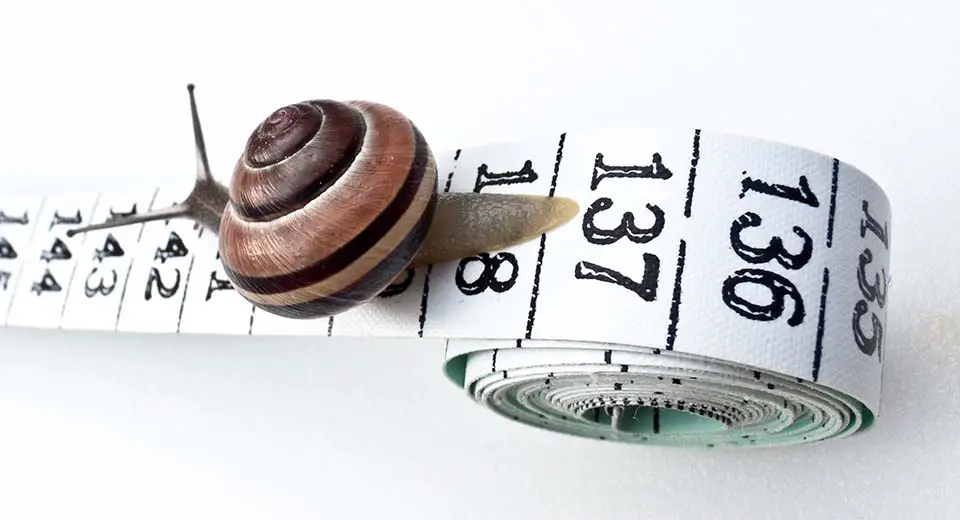
Maybe the most pernicious side effect of calories restriction and I’ll tell you why in the next chapter.
Basically, a lowered metabolism will burn fewer calories on a daily basis. The rate at which your body is able to burn calories, also called metabolic rate, defines how much calories you need.
The body is trying to adapt to less food and less energy intake, thus one of the side effect of calorie restriction will be to reduce the metabolic rate, in order to burn less calories.
This will directly impact all of the aformentioned effects of calorie restriction.
Calorie restriction can reduce the metabolic rate by up to 23% according to this study. This is expected since your body’s adapting to your new eating habits (or environment).
One of the biggest impact on lowered metabolism can actually come from muscle loss, according to several studies.
Can You Keep The Weight Off?
It will be incredibly hard to keep the weight off with calorie restriction.
What happens when your body reaches your daily calorie intake, is that weight loss will plateau. And if you’ve reached your goal, that’s fine, that’s what you want.
Except even if you keep counting calories in order to keep the weight off, even if you’re still following the diet, you will start regaining weight after some time.
The big scam about calorie-restrictive diets is that once you go back to eating normally, you’ll most certainly put some weight back. If not all the weight back. And then some.
Do you know the television show “The Biggest Loser” where contestants who are overweight attempt to lose the most weight in a given period, in order to win a big prize?
I never watched the show, being from Switzerland, I never even new the show before Jason Fung mentionned it in his lectures and articles on keto and fasting.
The show is all bout eat less, exercise more and contestants eat an average of 1’000 – 1’200 calories per day, which is really low.
In 2016, a study was conducted on 14 of the show’s competitors willing to participate, to take a look at their metabolic adaptation and body composition 6 years after they competed in the show.
With the eat less, move more approach, the low-calorie diet, their metabolic rate plummeted during the show. Their body had to find ways to burn 800 fewer calories a day, so it adapted.
So, the study wanted to take a look at how their slowed down metabolic rate influenced their body composition after the show and how their resting metabolic rate would evolve in 6 years.
To give you an idea of the weight contestants lost during the show, their average weight before the show was around 150 kg (328 pounds) and 91 kg (200 pounds) after the show.
Here’s a table showing their weight, body fat, fat free mass, metabolic rate, etc. after 30 weeks of competition and after 6 years:
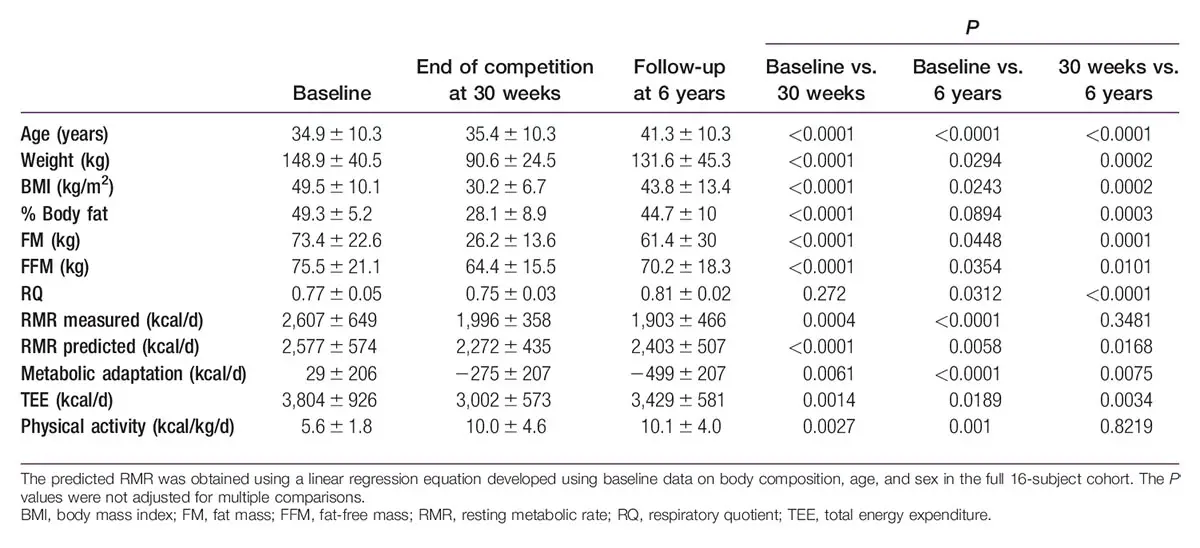
So to be clear, their average weight was 90.6 kg at the end of the competition, after 6 years, the average weight was 131.6 kg. Of the 14 contestants, only one didn’t regain its weight.
4 of them reported that they had put back even more weight than before the show.
You might think that it’s simply a lack of willpower, 13 of these patients are simply lazy, how hard can it be not to regain 40 kg back for crying out loud?
Take a closer look at the table and check out their measured RMR (resting metabolic rate), how much calories did they burn on a daily basis, before the contest, after the contest, and after 6 years.
They started with an RMR of around 2’607 kcal. After the competition, their metabolism dropped to 1’996 kcal. After 6 years, surely it must have come back up? Nope, it even went further down to 1’903 kcal.
When you force your metabolism to lower calorie expenditure, force it to slow down, it simply doesn’t go back up right after.
So if you go back to eating normally, your body will still be burning the same amount of calories, regardless of how much calories you actually eat.
Leading to weight gain.
Now you might think: what about the idea that the calorie hypothesis is just measurement? If calorie intake doesn’t directly impact weight, why would more calories mean more weight all of a sudden?
In short: if weight loss is not about calories in, calories out, what is it about?
It’s all about hormones.
How Ghrelin Levels Affect Weight Loss
There are three big hormones that are heavily linked to weight loss: insulin of course, but also leptin and ghrelin.
Leptin is the satiety hormone when leptin levels are high, it’s telling your body that you ate enough and you’re full. This way you don’t overeat.
Ghrelin is the hunger hormone, telling your body to eat when hungry. If ghrelin levels are high, then you’ll want to eat.
This is a bit reductive as both hormones play other important roles in the body, for example, leptin is also linked to thyroid regulation, but you get the idea.
How exactly are these two hormones reacting to calorie restriction? You might already have the answer if you tried restricting calories.
It seems that when on calorie restriction, through metabolism adaptation, leptin levels will go down. Researchers are not sure if decreased leptin levels are one of the causes of slowed-down metabolism or the opposite, but the results are there.
Ghrelin levels on the other hand will stay high during calory restriction. Meaning you’re always hungry. And it’s not your body playing tricks with you.
It’s your body telling you that you keep eating every few hours, but never to full satiety, so ghrelin is released in order to stimulate hunger and make you eat more.
You can see how ghrelin levels will increase after calorie restriction, for example in this study conducted on twelve non-obese women.
This means when doing calorie restriction, you’ll suffer not only from slow metabolism and fatigue, but also increased hunger. Keeping a diet in these conditions is really, really hard.
What About Insulin?
Last but not least, the infamous fat storage hormone, the cause for all of our weight problems: insulin.
Let’s not antagonize insulin, it plays a really important role in the body. It’s just that we don’t like insulin when it’s too high or deregulated or when your body becomes resistant to it. But hey, that’s your own damn fault anyway!
How does calorie restriction impact insulin levels then?
It doesn’t really, not if you keep eating at least three times a day, following a normal diet with a normal amount of carbs.
Since this diet is all about calories, reducing insulin never enters the equation, and being constantly eating, means insulin gets released in the body all the time.
This means if your suffering from insulin resistance when you start the diet, this will not help improve your condition.
And from another pathway in the body, it even seems that higher ghrelin levels in the body could directly impact insulin resistance:
[…] Date et al. reported that ghrelin stimulated insulin secretion by increasing cytosolic free Ca2+ concentrations in β-cells (Date et al., 2002). These findings indicated that ghrelin may alleviate insulin resistance in an endocrine and/or paracrine manner.
https://www.ncbi.nlm.nih.gov/pmc/articles/PMC6160589/
The big problem of calorie restriction is that, by being all about calorie in, calorie out, and not much about how what you eat may affect your body’s essential weight controlling hormones.
How insulin affects weight and other conditions such as metabolic syndrome, insulin resistance, or cardiovascular diseases are never addressed.
To conclude on the subject, I would like to present to you a study documenting the stunning failure that calorie restriction is.
This randomized study was conducted on around 50 000 women who had to follow a low-calorie and low-fat diet, with increased exercise. Eat less, move more, with some emphasis put on low-fat, the ultimate diet combo.
Here are the overall results in weight loss: the white dots are the control group, which didn’t change their diet, the black dots the study group.
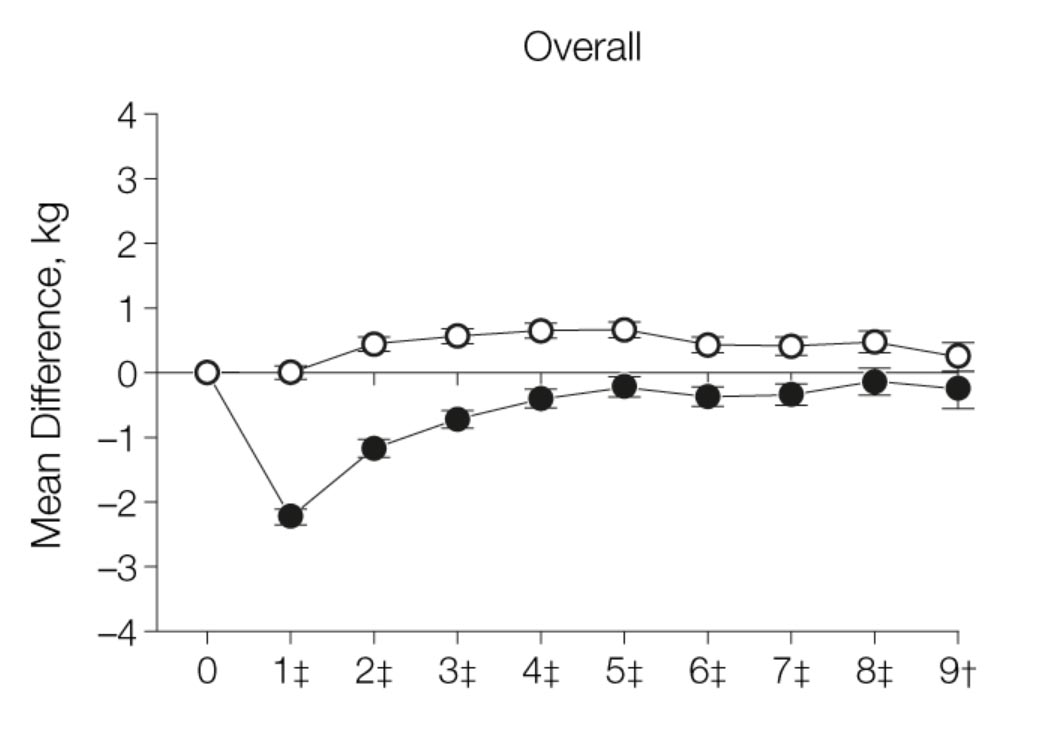
Pretty self-explanatory wouldn’t you say? By lowering the metabolism and not addressing insulin in any way, calorie restriction doesn’t do much for weight loss in the long term.
And you might think maybe with the 14% increase in exercise, those women regained weight mainly as muscle, but after measurement, it wasn’t even that.
After almost 8 years on a so-called diet, they were able to lose an average of 2.2 pounds (less than a kg).
Yes, I’m heavily biassed on this subject
If you’re still reading this article and you believe in calorie restriction, you might just see me as this guy ranting about an effective method to lose weight if done right, advocating for the new trendy techniques of fasting.
And you’re right, I’m all about fasting on this blog. So, of course, I’m biassed on the topic. But this doesn’t keep me from being objective.
I have no interest being anti-calorie-restriction and pro-fasting just for the sake of it.
I’ve tried the eat less, move more approach for many years.
I’ve tried eating little portions 3 to 5 times a day and running for an hour 3 times a week, taking a look at how many calories I had actually lost during the exercise, etc.
I never went as far as reducing calories drastically and counting each one of them, sure.
But I must have been doing this eat less, move more approach for around 5 years, around the time I started looking puffy in all my shirts.
My goal wasn’t a big one, I just wanted to lose 5kg (around 12 pounds) and be able to stabilize my weight there.
In five years trying to do that during the week (with some parties on the weekend, I admit it), I ended up putting up around 7 kg more.

This by being by the book most of the time. And still feeling so hungry at noon after I finished a little fist worth of pasta with a small chicken breast in its juice (without any cream of course).
After a while, I just gave up.
I was always bloated, I suffered from stomachache most of the time, I was trying but I kept putting on weight.
Forget it, I’m just going to keep getting fat, that’s the way it is, might as well settle with it. It’s not such a big deal.
I just don’t have enough willpower to pull this off, losing weight is hard, very hard, and if you’re a lazy bastard like me, you’ll just grow obese and that’s that.
That’s around the time I first read about fasting, which sounded suspiciously like the miraculous cure.
And trust me I wasn’t sold on it right away. To me fasting was this spirituous crap, that was unhealthy and would make you eat more in the long term, to compensate for the deficiencies you put on your body during the fast.
I knew someone who only ate once a day, and felt absolutely sure it was unhealthy. Even though she was thin and looked great. This was starvation!
And then I read more about fasting. I started to see the logic behind not eating for a whole day, versus eating 5 times (duh!). I started understanding the science behind it.
I finally convinced my girlfriend to try 16:8 intermittent fasting with me. We adapted in no more than a week. I lost around 12 kg (around 26 pounds) and her 18 kg (40 pounds) in a year and a half.
Not ever feeling obsessed about it, just implementing a habit and sticking to it. It’s easy and it works.
Sorry for being all about me, but I think it’s important to give you some context. If eating less, moving more was the absolute best diet, I would be recommending it right here.
But it really is not.
Counting calories and how much you eat during a meal is not nearly as important as how often you actually eat.
How Any Type Of Fasting Works?
Again, since I didn’t take into account what people would eat during a calorie restriction diet, assuming they still eat rather healthy food, we won’t consider what to eat during fasting.
It’s not irrelevant, it can have a big impact on your condition and weight loss.
But that’s not the point of fasting. Fasting is about eating less often. Or to be absolutely correct, reducing your eating window.
If you implement any type of intermittent fasting, what you’ll basically do is spend longer period not eating, not getting any calorie, any sugar, any food.
Mostly, during fasting periods, you’ll get water, still or sparkling, tea without added cream or sugar and black coffee. That’s it.
The idea is to train your body to tap into your fat stores in order to burn it as energy, rather than giving it food throughout the day.
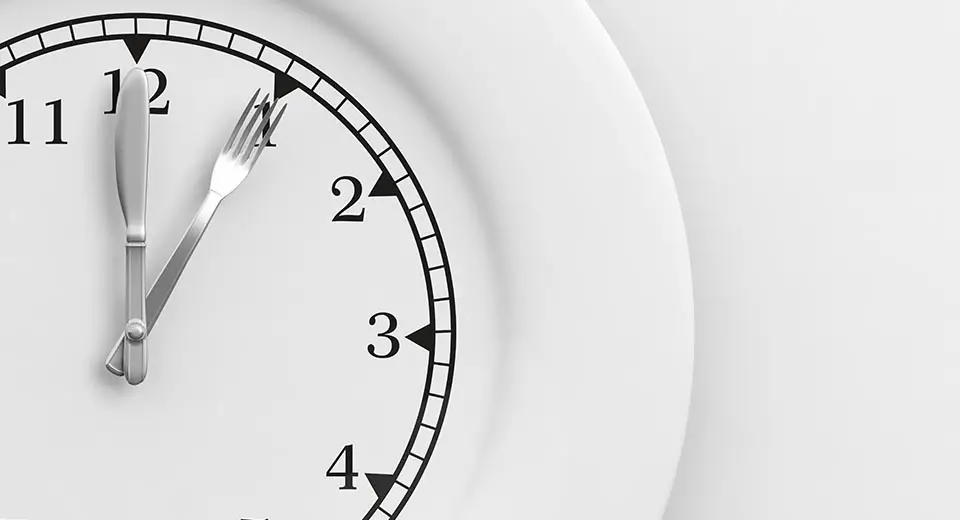
Depending on what type of intermittent fasting you’ll be doing and how long you’ll go without eating, you’re fasting method will be called 16:8, or OMAD for one meal a day, or 5:2 for alternate-day fasting.
Check out my complete article on every type of intermittent fasting and find which one might suit you best.
When I say reducing your eating window might be more accurate than eating less often, this means if you’re doing 16:8 for example, you’ll be fasting during 16 hours of the day and eating during 8.
Nothing prevents you to eat 5 or 6 times during those 8 hours of eating window. That’s your call.
But it will be way harder to eat 6 times during those 8 hours, than it would be during a whole day.
When doing intermittent fasting, you will eat less and certainly get fewer calories, so you’ll be doing some type of calorie restriction, but that’s not really the point.
You can use calories as a measurement if you want, if you still find it important to count calories, sure.
Getting fewer calories will come naturally, because the time you’ll spend fasting, your body will be forced to use your glycogen stores and some of your fat stores.
Fasting: How Eating Less Compares To Eating Less Often?
Weight Loss
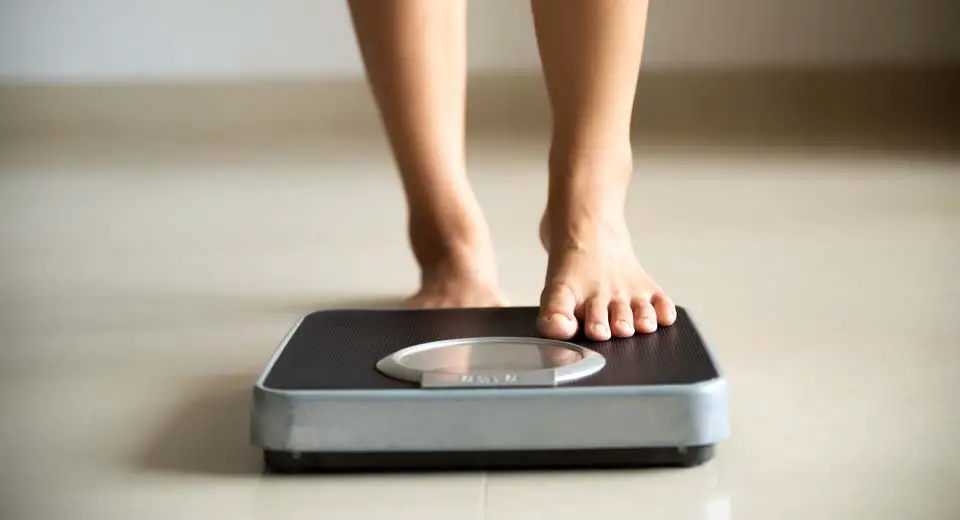
Weight loss through fasting is a natural thing. Here’s how your body is on when you’re fed :
- High insulin
- High glucose
- Burning glucose
- Storing fat
That’s it in a nutshell and that’s mostly how your body is most of the time when eating 3 to 5 times a day, even when eating few calories.
On the other hand, when you’re not eating for extended periods, meaning you’re fasting, you’ll have :
- Low insulin
- Low glucose
- Liberated fat
- Burnt fat
When you’re fasting through intermittent fasting, you’re training your body to get fat adapted. Fat adaptation means you’re body’s ability to burn fat is improved.
The body will increase insulin sensitivity and promote fat mobilization into free fatty acids from fat cells. It’ll also upregulate fat-burning pathways on a cellular level.
Fasting will definitely make you lose weight, it all depends on how often you’ll eat, but also what you eat. Low-carb or even ketogenic diets will help even more, but IF alone can already do wonders.
You can check out tons of testimonials on the web about how fasting helped people lose lots of weight and keep it off.
Maybe going 800 calories a day will make you lose more weight than any type of fasting I could recommend. But it won’t be healthy and neither will it work and be sustainable in the long term, with fasting it’s quite the opposite.
No Muscle Loss

That’s one of the main complain and fear from people: fasting will burn down muscle.
No type of intermittent fasting will impact muscle loss, as long as you keep a regular exercise routine.
You would lose muscle loss on any type of diet by doing nothing, it’s exactly the same with intermittent fasting.
Check out this 2010 study, taking a look at how alternate-day fasting with a study group fasting every other day affected lean mass during a period of 70 days.

It didn’t affect it. They lost fat-mass, their BMI dropped a bit, but fat-free mass fluctuated a bit but didn’t really change.
So if you keep active when fasting, you won’t lose any muscle mass, the same as with eating normally.
And even if you try doing longer fasts. Tim Ferris claims in his book Tools of Titans, that he’s done a 10-day fast while keeping an exercise routine and that it didn’t affect his lean body mass.
You might think that’s BS, but he also tried doing a 7-day fast, where he was under medical supervision and couldn’t leave his bed. He lost about 6 kg of muscle mass during this fast.
To conclude I will say this again, keeping sedentary or starving your body will make you lose muscle mass. Intermittent fasting or even prolonged fasts (up to 10 days) will not.
If you really want to know everything about how fasting affects muscle loss and muscle gain, as well as tons of other studies proving this point, check out my complete article on the topic.
More Energy And Focus

Let’s be completely honest: any type of fasting will result at first in side-effects pretty close to what you would experiment with calorie restriction.
Fatigue, nausea, headache, stomachache, you might experience all this or only a subset of those, but fasting will have a negative impact at first.
I even did a full article on how fasting and keto will affect sleep and energy.
When forcing your body to turn to fat stores as energy, you’ll be changing your whole body’s machinery. It’s not that the body doesn’t know how to do it, is that it’s really not used to do it at all.
Since we’ve been eating like that our whole life, it’ll be challenging for your body to adapt at first.
Leading to some of these aforementioned discomforts. Moreover, fasting might also affect sleep at first, by disturbing your circadian rhythm.
But what you need to take out of what I’m saying here is: at first.
Once your body gets used to your new eating habits, things will change. There are two main changes to account for these changes:
- You’re body, when fasting, will run more on ketone bodies. Ketones are produced by the liver from fatty acids, and they’re the preferred source of energy for the brain. Leaving you more acute and focused
- Do you know how you often feel tired after a meal? Digesting costs energy and when you’re not eating, you’re not digesting, thus you’re more energized throughout the day
Another thing about getting your energy from fat stores is that your body doesn’t rely on glucose for energy, so there are far fewer ups and downs during the day, your body will use and burn energy steadily, according to your needs.
Stable Or Increased Metoblism

So, how fasting might affect metabolism, since calorie restriction seems to slow it down?
The complete opposite happens. Metabolism will actually go up with fasting, meaning your body will be able to burn more calories.
There’s a common idea about metabolism saying that the less often you eat, the slower your metabolism actually gets.
This comes from thermogenesis. Every time you eat and consume calories, your body will produce heat in order to break down and digest food, thus burning more calories and increasing metabolism.
This also known as the thermic effect of food, and it’s a real thing. It accounts for around 10% of your total calorie intake and it doesn’t matter how often you eat, what’s important is how much.
So, eating more or less often as no effect on thermogenesis. Eating more to increase metabolism through the thermic effect of food is a myth.
It seems that overall, metabolism will increase through any type of intermittent fasting. Studies have shown that fasting for short periods will boost the metabolism by up to 14%.
This type of increase seems to come from the raise in norepinephrin while fasting, which promotes fat burning.
There are other studies stating that metabolic rate didn’t change during a 22 days alternate-day fasting period, while calorie restriction can amount to hundreds of calories per day.
Can You Keep The Weight Off?
Implementing fasting is way more about creating a eating habit than forcing you to eat a certain way.
Once you’re able to do intermittent fasting, any kind, which shouldn’t take more than 2-3 weeks for 16:8 IF for example, you’ll see it will even be harder to go back to eating three times a day.
Breakfast or dinner or whatever meal you will be skipping will be hard not to skip, simply because you won’t be hungry. And if you still eat, you may experience some discomfort (unusual bloating, stomachache).
I wouldn’t say intermittent fasting such as 16:8 is the quickest way to lose weight. Doing one meal a day or certain types of alternate-day fasting (which I find harder to do), will be more efficient.
But whatever the type of IF you’re going to do, once it’s implement, you will lose weight and once the weight is loss, nothing will make you eat back what you lost.
Fasting is not starving your body in any way, it’s healthy, and you can do it every day.
Since fasting will help increase metabolism, or at least stabilize it, you won’t regain tons of weight after a while, even if you go back to eating normally.
Fasting won’t impact muscle mass, your metablism won’t slow down, and you won’t suddenly get less efficient at burning calories.
In fact, your body will have lots of practice tapping into your fat stores for energy. So, yes, sure, you will keep the weight off, no question about it.
And on top of intermittent fasting, you could consider trying doing prolonged fast here and there.
I wrote a full guide on how to do a prolonged fast (up to 7 days), check it out! But that’s a great way to detox your body, but also lose more weight and free yourself from the angst of weight loss.
It’s also one of the many advice I would give you to break a weight loss plateau on intermittent fasting.
I’m saying the same thing again and again in my articles, but fasting is the easiest way to lose weight continuously, and to keep the weight off.
It’s the absolute no friction diet: you don’t have to be obsessed about what you eat, you don’t have to count calories or carbs, all you have to do is take on the habit of eating less often and it’ll work.
And fasting will work with many other diets of course, that’s another beauty of it.
What About Hormones?
When talking about calorie restriction I said that these types of diet don’t even register hormones in their approach.
Which is crazy, since weight regulation, and it has been shown again and again, is a hormonal thing.
Fasting will mainly affect hormones in the following way :
Insulin
Fasting, along with low-carb, is the single best way to decrease insulin levels in the body. Too much insulin in the body, coming from eating too often and too many carbs, will result in insulin resistance.
And insulin resistance can lead to a range of other problems, such as metabolic syndrome, fatty liver disease, diabetes, cardiovascular diseases, etc.
Fasting not only reduce insulin levels, but by doing that it will actually increase insulin sensitivity.
Blood levels of insulin will drop significantly when fasting, allowing your body to tap into fat stores more efficiently.
Ghrelin
The hunger hormone will also be affected by fasting. But it won’t simply drop because you won’t be hungry anymore.
This study measured ghrelin levels of patients fasting for 33 hours. In the following figure, you can see how ghrelin levels where affected during this time:
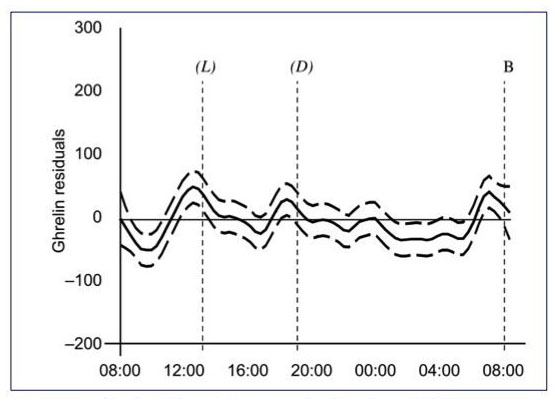
Can you see the pattern? Ghrelin levels elevate with times of the day according to meals you would usually get. Lunch, dinner, and breakfast the next day.
This is understandable, we’re used to eating around those times and we are used to getting hungry. But as you can see, ghrelin levels don’t stay up, they simply go down even if the patient didn’t eat anything.
These fluctuations come from habits. I’m convinced that if they measured a bunch of people who had done intermittent fasting for a while, this chart would be completely different.
And here’s a grap of overall ghrelin levels during the 33 hours fast:
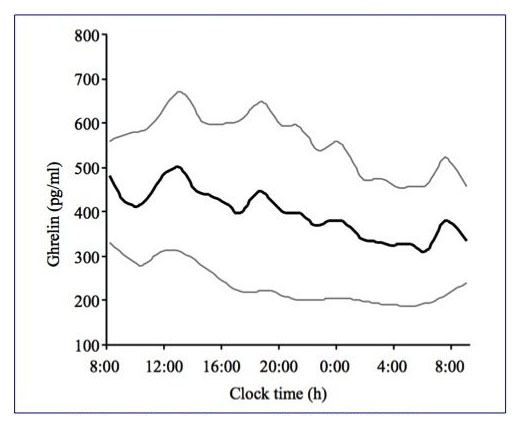
It simply keeps going down. If you ever do a prolonged fast, you’ll feel that after 3 to 4 days, you’re not even hungry anymore. Ghrelin levels go all the way down now.
There’s no need to eat, your body has reached ketosis and your burning fat for fuel.
When doing any type of fasting, you’ll affect ghrelin levels through habits. And overall ghrelin levels will get lower, since you won’t be eating constantly.
Leptin
Leptin’s signaling, the satiety hormone, comes from fat cells. People suffering from obesity actually have high leptin levels. Which is logical, if you have enough fat, leptin is signaling you don’t need to eat.
Except just like too much insulin causes insulin resistance in the body, too much leptin does the exact same thing.
Thus, preventing leptin from efficiently signaling that you had enough to eat, meaning you’ll still be hungry even when you don’t need to eat anymore.
Fasting will cause a drop in leptin levels, which means your body will get hungrier at first. But reduced leptin in obese people may actually be a good thing.
In this trial on obese patients, following alternate-day fasting, they measured a 21% drop in leptin levels.
The downside will be increased hunger, but when fasting regularly, this could help decrease leptin resistance and through fat burning, these effects could even be increased.
Takeaways
All in all, intermittent fasting is also a type of calorie restriction.
When you read an article stating calorie restriction could reduce aging, help energy levels, etc. they’re rarely saying you should cut down your calories to 1200 a day, count every last one of them, and starve your body.
There are many ways to eat less, thus reducing calories. But focusing on calories is an old and outdated idea.
It’s been found that weight regulation is a hormonal process, it’s not something that you can simply regulate with some math about calories in calories out.
I know that fasting may seem like a trendy word. To me, it certainly did at first. I was picturing myself growing my hair, wearing flower-patterned t-shirts, and fasting.
But if you have a problem with the wording, simply call it eating less often. Or reducing your eating window. It doesn’t have to be called a fast, you just need to reduce the frequency of your meals and snacks.
When presented like that, it doesn’t seem like such a stupid, unconventional idea does it?
Maybe I’m a bit harsh with the whole calorie thing, if when you think about calorie restriction, you think about eating healthier food and generally eating less, that’s great.
But depending on how you implement that, it might get really hard and the results won’t be what you might expect in the long term.
While fasting will make you do just that, eating less, while still eating healthier food. You’ll be able to follow it more easily, it’s sustainable and it has many long-term benefits.
Just stop counting, obsessing and harming yourself to lose weight, there are easier more natural ways to do it!

